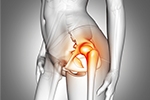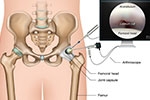Plenty of Americans experience varying degrees of hip pain. Whether it’s due to a sports injury, a pre-existing condition, or the effects of factors like aging and lifestyle, seeking medical treatment can benefit a patient’s quality of life.
For most cases of hip pain, medical professionals recommend conservative non-surgical treatments. If these treatments don’t manage the pain and discomfort, patients may have to seek more invasive options such as surgery.
If you’re experiencing chronic hip pain and have exhausted non-surgical treatments with little success, you might need to consider more invasive surgical options. Your hip doctor can provide more information specific to your condition, but this article can help you manage your expectations on whether it’s time to see a hip orthopedic surgeon for treatment.
What Are the Common Ways a Hip Is Injured?
Hip pain can develop from pre-existing diseases and genetics. However, it can also stem from injuries as a result of the following:
- Sports Injuries: Athletes in contact sports can incur injuries from traumatic falls or collisions even while wearing safety equipment. In non-contact sports like running and track and field, athletes can injure their hip joints from overexertion and wear out their joints, tendons, and ligaments.
- Accidents: Slips, falls, and vehicular accidents can lead to severe hip injuries such as dislocations, fractures, and strains.
- Lifestyle: Obesity and sedentary lifestyles can put additional stress, causing chronic hip pain. Additionally, active people can wear out their joints and the parts around them, causing hip pain and limiting mobility.
- Age: The hip joint cartilage wears out with age, so older patients are more likely to experience hip pain from conditions such as hip arthritis.
In many cases, medical professionals prescribe non-surgical solutions, such as:
- RICE Method: Healthcare providers recommend rest, ice, compression, and elevation. These can help reduce swelling and inflammation.
- Medications: Patients may be prescribed over-the-counter pain relievers to manage their condition. For more severe pain, doctors may prescribe pain relievers that require pain relievers or injectable solutions.
- Physical Therapy: Physical therapists can provide stretches and exercises to strengthen hip muscles and relieve pain.
- Lifestyle Changes: Using mobility aids like walkers or giving your body time to rest after strenuous activities can minimize hip pain.
Is It Time To See the Orthopedic Surgeon?
If you’ve exhausted all forms of applicable non-surgical treatments, your doctor may recommend seeing a hip orthopedic surgeon. Some of the signs that you need to see one include:
- Reduced Quality of Life: Hip pain might be limiting your mobility, making it difficult to perform your daily tasks or more grueling tasks. If you find it nearly impossible to perform the necessary activities to get through the day, you may need to seek more invasive procedures.
- Other Body Parts Are Affected: Those who experience severe hip pain may also find the pain spreading to their knees, legs, and back. This can limit their mobility for everyday movements such as standing, walking, and bending over.
- Difficulty Sleeping and Getting Out of Bed: A good night’s sleep can affect the rest of your day. Being unable to sleep comfortably or get out of bed because of hip pain can affect the rest of your daily schedule.
- Symptoms Aren’t Subsiding: Symptoms such as swelling and hip pain can subside after several days with proper home care. If these symptoms haven’t been alleviated, an underlying issue may require more invasive treatment.
What Surgical Treatments Are Available for Hip Pain?
A hip orthopedic surgeon can discuss the possible surgical options to help you manage your hip condition. Some of these options can include:
- Arthroscopy: A minimally invasive procedure where small incisions are made and a camera is inserted to diagnose the issue causing hip pain. If surgery is required, your surgeon will use specialized arthroscopic tools to handle your surgery.
- Hip Replacement Surgery: Your surgeon may partially or totally replace your hip joints with prosthetics. This is often the solution for older patients with degenerative hip arthritis and severely worn hip joints.
- Hip Resurfacing: Your surgeon will shave off a portion of the joint bones and resurface them with a metal covering. Unlike hip replacement, where the entire ball of the ball-and-socket joint is removed and replaced, only the damaged part of the ball is removed and replaced.
What Is the Recovery and Outlook for Hip Surgery?
In the hands of a capable doctor, surgery may restore your mobility and alleviate your hip pain. How invasive the surgery is can determine how much downtime and recovery your body needs following the procedure. Your doctor should provide you with a rehabilitation plan.
After surgery, you will need to recover for several weeks. During this period, you may have to use crutches, a cane, or a walker to help you move and avoid putting too much pressure on your hips. You may also need medication to manage the post-surgery pain and physical therapy to help you adjust to your widened mobility. You may also need to schedule regular check-ups with your surgeon to ensure your body is healing.
A hip arthroscopy is the most minimally invasive surgical procedure for the hips, and it takes around six weeks for most patients to recover. After 12 weeks, they can resume their high-activity lifestyle. Other options are much more invasive and require several months to recover. The implants or prosthetics can last a lifetime, though some rare cases may require additional surgery. Your surgeon can best guide you through a more accurate timeline for recovery.
Schedule a Consultation with a Nationally Recognized Hip Surgeon
In case non-surgical treatment options are ineffective at managing your hip condition, you may need to consider more invasive surgical procedures. You can achieve the long-term benefits of seeking surgery for your hip through a capable orthopedic surgeon providing a personalized treatment plan.
Benjamin Domb, M.D. is a nationally recognized orthopedic surgeon specializing in hip surgery. Having extensive experience helping athletes and everyday individuals, he has pioneered advanced techniques in hip arthroscopy. Dr. Domb has worked with patients from all over the country who fly to Chicago for his services.
Request an appointment by filling out this online form , or call (833) 872-4477 for bookings and inquiries.





